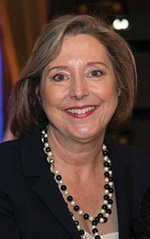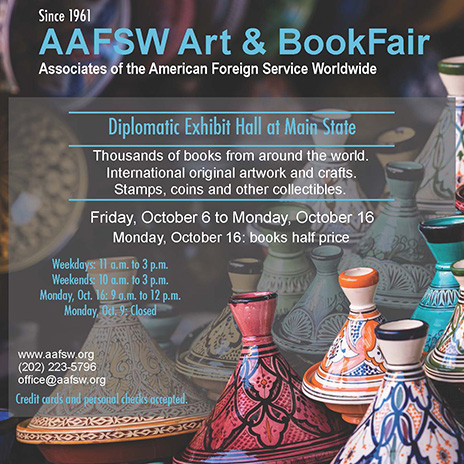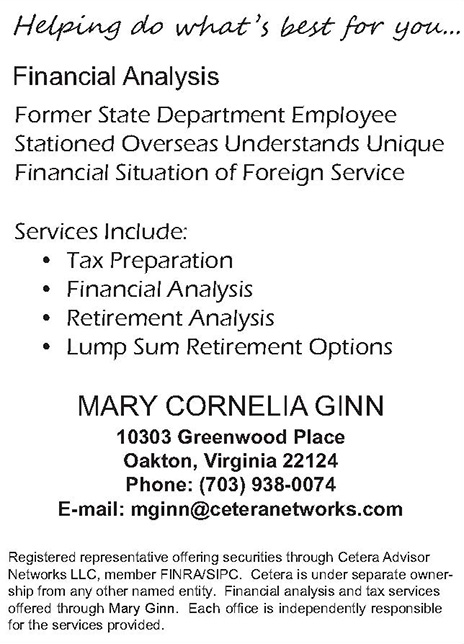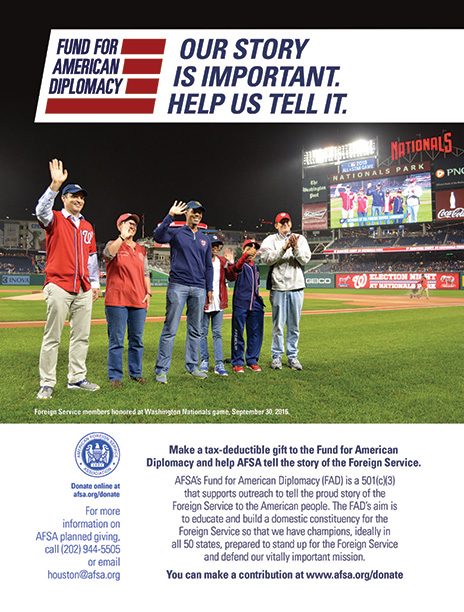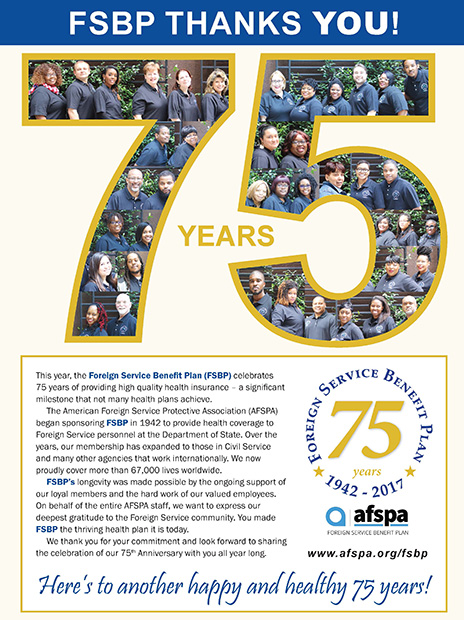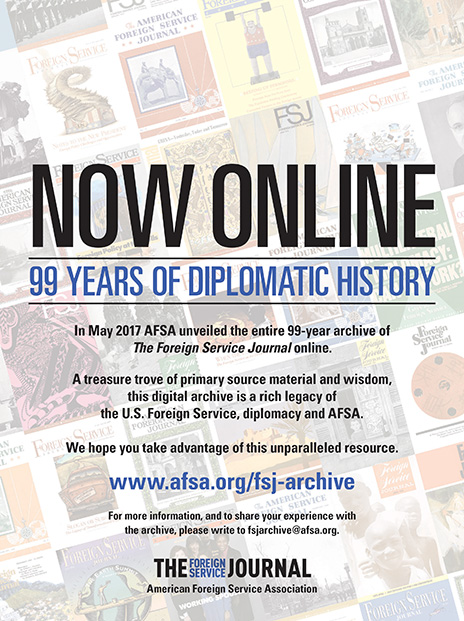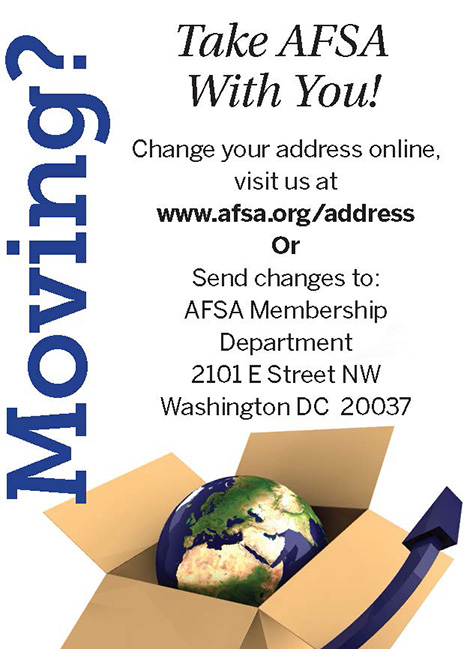Making It Work: Conversations with Female Ambassadors
Seven female ambassadors candidly discuss the challenges and successes of building both careers and families.
INTERVIEWS CONDUCTED BY LESLIE BASSETT
During a recent virtual ambassadors’ roundtable, initiated by the group Women Ambassadors Serving America, seven female envoys agreed to share their experiences building both their careers and their families, and the specific successes and challenges they encountered along the way. We recognize that male colleagues face similar challenges and hope the excerpts from these interviews are insightful for all.
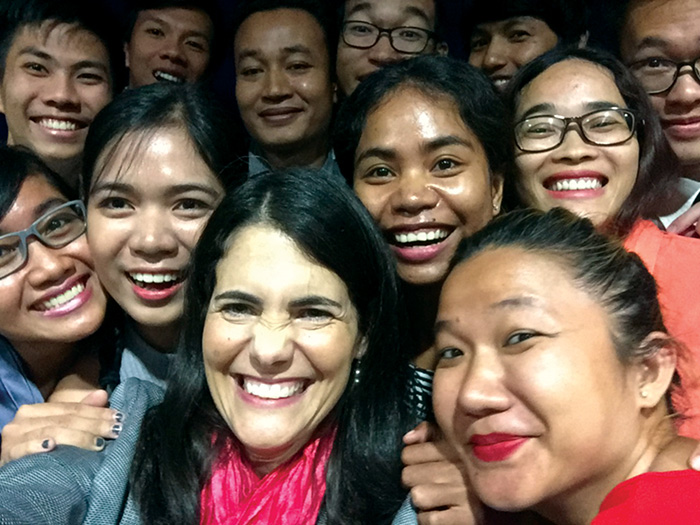
While serving as U.S. ambassador to the Association of Southeast Asian Nations, Nina Hachigian visited all 10 ASEAN countries, and took this selfie along the way.
Amb. Leslie Bassett: Tell us about a time when your professional and family responsibilities came into conflict.
Amb. Gina Abercrombie-Winstanley: Our toughest time was during my three years as principal officer in Saudi Arabia. Our daughter was 6 and our son was 9. In addition to the many cultural challenges, my family was evacuated twice before being prohibited from returning to post. The three-year tour kept us apart for 18 months. We had to decide whether I should curtail, or separate the family. I was warned by a colleague that such separations had ended his marriage and I should consider my decision carefully. Fear of stalling my career and confidence in our relationship led my husband and me to decide we could manage the separation—and to underestimate the impact on our children.
We had early affirmation of the decision as I learned shortly after that I was being nominated as an ambassador based on my performance in Saudi. Nonetheless, our son was angry for years about the separation, and we’ve all had some therapy to deal with the fallout.
Amb. Nina Hachigian: While I am generally decisive, decisions that weigh family against career priorities take longer and feel more wrenching. As an ambassador, I do have some control over my schedule, and that helps. It was the worst when I was at the National Security Council, working crazy long hours, and couldn’t even talk on the phone with my husband without constant interruption. He had moved to D.C. for me, and our marriage was tested by that experience.
Amb. Deborah Malac: Parenting from thousands of miles away is a particular challenge. Although I felt competent at my job most of the time, I often did not feel so confident when it came to parenting and the things I thought I “should” be doing. Particularly when I was working in Washington when my children were small, there was a lot of stigma attached—especially for female officers—to leaving the office at the end of the day to pick up your children from day care (these were the days before Diplotots). We weren’t considered “serious” about our work.
My first child was born while we were in Bangkok. Being a pregnant political officer who wanted time off was enough of a shock for my colleagues in the section; but when I needed to extend my time off by a little bit longer, I found out that there were back-channel communications between the political counselor and the office director in Washington about my “lack of seriousness” about my job.
Amb. Amy Hyatt: My biggest work-life challenge was during an ordered departure in Cairo, where I was the management counselor. I was a single mom and had to put my teenage daughter on a plane to the States without me. I had no family in the States to send her to, but relied on dear friends to meet her at the airport and take care of her, while I focused on helping the embassy deal with the evacuation. It was the toughest thing I had to do as a parent in the Foreign Service.
Amb. Jennifer Zimdahl Galt: I was faced with the choice of staying at a post with a toxic work environment or curtailing at the risk of interrupting my children’s high school education. After many lengthy family discussions, I chose to curtail. It was the first time in my career that I could not get along with a supervisor, in this case the ambassador. I had not been his choice for the position, and he resented my presence from day one and made no effort to pretend otherwise. Our conflict had nothing to do with our respective genders—my predecessor had been a woman with whom he got along famously. During our family discussions, it also came out that neither of my children was altogether happy with the school, so while they weren’t happy to move three years in a row, they didn’t mind leaving the school. Somehow things always work out.
I think the most important thing is to be prepared, so you can speak authoritatively and there is no question that you are on top of your brief. —Amb. Jennifer Zimdahl Galt
LB: Have you ever been subject to harassment or discrimination; and, if so, how did you handle it?
Amb. Gina Abercrombie-Winstanley: Sexual harassment, yes. My generation was taught to be careful of male egos (and power), so I generally did the usual and laughed it off, avoided the person where I could or made excuses to reject the advances. There was one occasion in the department when a boss touched me and I told him if he did it again, I’d knock the s--- out of him. He did not repeat it, but he did try to get me to curtail from the position.
On another occasion it happened at the National Security Council. Initially I parried the advance from a senior member of Congress, but when he continued to call me I reported to the NSC’s executive secretary that it was happening, and told him that if I had to do violence to repel it, I would. I was letting him know beforehand, I said, because I did not expect to lose my job as a result. After a moment of shocked silence, he said “Thanks for letting me know.” And the member stopped calling me.
LB: In an average month, how many meetings do you attend where you are the only woman, or women are a minority in the room? How did you make space for your voice to be heard as you were rising in your profession, and how can we broaden that space for others?
Amb. Jennifer Zimdahl Galt: Throughout my career, I have been the only woman or one of the only women in the room at virtually every meeting. Some of this may have to do with the fact that I’ve served much of my career in the Bureau of East Asian and Pacific Affairs, where societies continue to be male-dominated. But the same has been true of country teams at posts where I’ve served. The largest number of women I’ve ever had on a country team was three out of 12. I’ve never served with a female principal officer or ambassador.
I think the most important thing is to be prepared, so you can speak authoritatively and there is no question that you are on top of your brief. It’s also important to dress professionally, which in my book means wearing a suit at all times. Half of speaking or presenting in a meeting or at country team is listening—being sure to listen carefully to what others have to say so that you’re not repeating, but rather amplifying and adding value with your remarks.
Amb. Laura Dogu: I am frequently the only woman in meetings outside the office with the host country, and when I have control over the guest list, I insist that we include at least 30 percent women, if not more. When dealing with the press, I always make sure to respond to questions from women, despite male reporters often speaking over the top of them. In our internal meetings, it is less frequent that I am the only woman in the room unless I am dealing with law enforcement. At my last large post, I was the only woman among about 20 men in most meetings. I found I had to be forceful when speaking up, but after the first few times, people treated me like everyone else.
Amb. Gina Abercrombie-Winstanley: In most meetings over the years, I was the only minority at the table and that continues to be the case. I am often one of only two or three women. After 30 years, it is still not easy. I have to fight my own insecurity, as well as any unspoken, even unconscious, bias against the value of my contributions. The recognition of my performance and potential that came from reaching my goal of being an ambassador, however, has given me the space to feel like I don’t always have to know the answer. I have brilliant staff to help me get it right.
I have found low expectations of me as a minority to be a bigger obstacle than low expectations of me as a woman, though they both remain in good supply in the State Department. —Amb. Gina Abercrombie-Winstanley
LB: Can you share a formative experience (professional or otherwise) that helped shape your leadership vision and/or style?
Amb. Erica Barks-Ruggles: When I was a teenager, I was a newspaper carrier, and the district manager passed me over for a more junior (male) carrier for an important regional job that would have given me a pay raise. My parents supported my protest to the top management of the newspaper. I demanded fair treatment and the raise I would have gotten had I not been discriminated against (the district manager admitted that the only reason I did not get the job was because I was a “girl”). I got the raise. That taught me to demand equal treatment, not to settle for being passed over, and to always raise your hand and ask for the promotion/better job/tougher assignment. Nobody was going to give it to me just because I deserved it.
Amb. Jennifer Zimdahl Galt: Serving as principal officer in Guangzhou, overseeing a consulate general that more than doubled in size during my tenure. Because I did not have a deputy and the bureau didn’t support the creation of one, I was chief cook and bottle washer. Leading a team of more than 500, including 65 first- and second-tour officers, taught me more about management, security and personnel than I had learned in the first 25 years of my career. I loved every minute of it and would do it again in a heartbeat.
Amb. Laura Dogu: When Mary Ryan was the assistant secretary in consular affairs and I was the visa chief in the Middle East during 9/11, Mary sent a message saying she was forced to share the names of the officers who had issued visas to the hijackers. She continued by saying that people should not worry because they did nothing wrong and she would not let anything happen to them. In the end, the only person to lose her job was Mary Ryan. She led by example. She believed successes belonged to her team but all their failures were hers.
LB: What has been the single biggest factor in your success? What was your most difficult obstacle?
Amb. Gina Abercrombie-Winstanley: I do not give up. I’ve been fired twice, though once I refused to go and was able to turn the situation around. I have found low expectations of me as a minority to be a bigger obstacle than low expectations of me as a woman, though they both remain in good supply in the State Department. I struggle against frustration at the lack of seriousness about increasing diversity in the department’s senior levels. We have to be held accountable for the results.
Amb. Deborah Malac: I was raised believing that if you work hard and always do your best, recognition will come. This is not, perhaps, the best approach to take in an organization that forces people to be shameless self-promoters in order to find the next assignment or to get that next promotion. Nonetheless, it has paid off for me. I have continued to bring my best every day and to look for new and interesting opportunities and assignments that take me out of my comfort zone, and offer an opportunity to learn something new or to develop a new skill.
Ambassador Deborah Malac
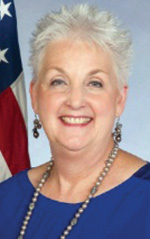
Deborah Malac joined the Foreign Service in 1981. She has served in a variety of positions in Washington, D.C., Africa and Southeast Asia. From 2012 to 2015 she served as U.S. ambassador to the Republic of Liberia; she has been U.S. ambassador to the Republic of Uganda since February 2016. Amb. Malac is married with three grown children.
Ambassador Jennifer Zimdahl Galt
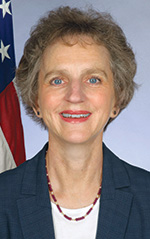
Jennifer Zimdahl Galt was sworn in as ambassador to Mongolia in September 2015. A career member of the Senior Foreign Service, Amb. Galt served previously as principal officer in Guangzhou. She has also served in Belgrade, Taipei, Mumbai, Beijing, Shanghai and at the U.S. Mission to NATO in Brussels, as well as in Washington, D.C. She holds master’s degrees from the National Defense University and the Johns Hopkins School of Advanced International Studies. Amb. Galt is married to writer Fritz Galt, and they have a son and a daughter, both in college.
Ambassador Erica Barks-Ruggles
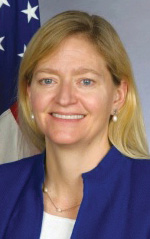
Erica Barks-Ruggles is U.S. ambassador to the Republic of Rwanda. She and her tandem husband are career Foreign Service officers. She previously served as U.S. consul general in Cape Town, as deputy to the United States Permanent Representative to the United Nations, and as deputy assistant secretary for Democracy, Human Rights and Labor. Amb. Barks-Ruggles served previously at the National Security Council, as a visiting fellow at the Brookings Institution and as an international affairs fellow at the Council on Foreign Relations. She has also been posted to Norway and India.
Her mantras: Always ask “What is the right thing to do?” and formulate policy and management around that. Never just do what is expedient, easy, uncontroversial or cheaper; do what is right.
And: Always be courageous in standing up for your beliefs and values, and in supporting your team.
Ambassador Amy Hyatt
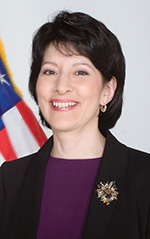
Amy Hyatt is U.S. ambassador to the Republic of Palau. She is a career Foreign Service officer of 31 years, who previously served as deputy chief of mission in Helsinki, consul general in Melbourne, management counselor in Cairo, and diplomat-in-residence at Arizona State University. Other postings include Korea, Thailand, the Philippines, Prague, Norway and Washington, D.C. Prior to entering the Foreign Service, she was a litigation attorney in San Francisco. She has three children.
Her mantra: Great leaders have a strong moral compass. They know how to do the right thing, even as others falter or succumb to temptation.
Ambassador Laura Dogu
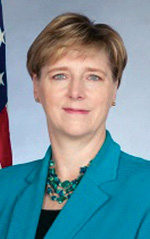
Laura Dogu was confirmed as the U.S. ambassador to Nicaragua in August 2015. She is a consular-coned officer and career member of the Senior Foreign Service, class of Minister Counselor. From 2012 through 2015, she served as deputy chief of mission at U.S. Embassy Mexico City. Amb. Dogu has received both the department’s Award for Outstanding Deputy Chief of Mission and the Barbara M. Watson Award for Consular Excellence. She is married and has two sons, both in college.
Ambassador Nina Hachigian
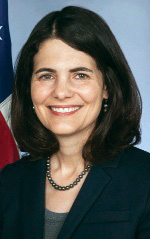
Nina Hachigian, a political appointee, was sworn in as the second resident U.S. ambassador to the Association of Southeast Asian Nations in September 2014 and served through January 2017. During her tenure, the United States and ASEAN became strategic partners. Previously, Amb. Hachigian was a senior fellow at the Center for American Progress and served as director of the RAND Center for Asia Pacific Policy. From 1998 to 1999, she was on the staff of the National Security Council under President Bill Clinton. She is the editor of Debating China: The U.S. - China Relationship in Ten Conversations and co-author of The Next American Century: How the U.S. Can Thrive as Other Powers Rise. Amb. Hachigian holds a bachelor’s degree from Yale University and a law degree from Stanford University. She is married with two children.
Her advice for younger women: Take a risk!
Ambassador Gina Abercrombie-Winstanley
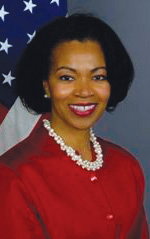
Gina Abercrombie-Winstanley served as U.S. ambassador to Malta from 2012 to 2016. A career member of the Senior Foreign Service, Amb. Abercrombie-Winstanley previously served as principal officer in Jeddah. She has also served overseas in Iraq, Israel, Egypt and Indonesia. In Washington, D.C., she served as foreign policy adviser at U.S. Cyber Command, deputy assistant secretary for counterterrorism and at the National Security Council. She holds a master’s degree from Johns Hopkins School of Advanced International Studies. Amb. Abercrombie-Winstanley is married and has a son and a daughter.
Her mantra: I wish I’d known I pretty much knew as much as my colleagues and to voice my ideas more.

